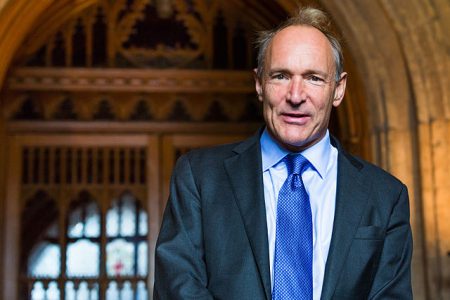November 6, 2018 – At a Web Summit conference being held in Lisbon this week, Tim Berners-Lee, inventor of the world wide web, has announced a set of principles going forward for Internet conduct. Called a Contract for the Web, it states in its preamble:
The web was designed to bring people together and make knowledge freely available. Everyone has a role to play to ensure the web serves humanity. By committing to the following principles, governments, companies, and citizens around the world can help protect the open web as a public good and a basic right for everyone.
The contract includes a code of conduct for governments, companies, and the general public. Berners-Lee hopes to see its worldwide adoption by May 2019 when it is estimated that half of the world’s population will have access to the Internet.
What is expected of governments?
- They must ensure that everyone can connect to the internet so that anyone, no matter who they are or where they live, can participate actively online.
- They must keep all of the internet available, all of the time so that no one is denied their right to full internet access.
- They must respect people’s fundamental right to privacy so everyone can use the internet freely, safely and without fear.
What is expected of business?
- They must make the internet affordable and accessible to everyone so that no one is excluded from using and shaping the web.
- They must respect consumers’ privacy and personal data so people are in control of their lives online.
- They must develop technologies that support the best in humanity and challenge the worst so the web really is a public good that puts people first.
What is expected of the general public?
- They must be the creators and collaborators of web content so that it is rich and relevant for everyone.
- They must build strong communities that respect civil discourse and human dignity to ensure that everyone feels safe and welcome online.
- They must fight for an open and global public web resource for everyone, everywhere, both presently and in the future.
Berners-Lee is the creator of the World Wide Web Foundation with a founding principle to fight for the resource that today is a mere thirty years old and under threat. In a report issued by the Foundation, it states that users of the Web are losing control of personal data and some of that is being weaponized against us. It further states that malicious actors are manipulating news and information and that governments are imposing censorship or shutting down the Internet within their countries.

It is hard to believe that the Web has only been with us for thirty years. My first experience with it goes back to the 1980s when I got my first email account. I worked on creating my first website in 1992. And today I am a contributor to content on the Web through this blog and a number of social media sites. The Web has changed my life as it has for almost half the planet. Today it is populated by nearly 2 billion sites created by individuals, companies, and governments. It is a free repository of humanity’s presence and nothing like it has ever existed before. It is what Berners-Lee intended it to be, a worldwide network for everyone.
But what constitutes the Web at present is also a cause for concern. Today’s Web is dominated by a handful of companies that provide information and accessibility. You know of them and have accepted their dominance. Just how dominant? Here are a few facts:
- Google Search today is responsible for 90% of all Web search activity.
- Amazon provides more than 50% of all cloud services.
- Facebook has more than 2.2 billion active users.
- And WhatsApp, the texting application owned by Facebook, has 1.5 billion users.
The moral and ethical responsibilities of these Internet companies cannot be understated. And yet as recent events have pointed out, there are many cracks in these companies and their ability to ensure that the information they provide is true, that usage is transparent, and that we are being dealt with honestly. The following two examples cited in the Foundation report illustrate this:
- Automated job recruitment Web tools today are using algorithms that favour white, male candidates over females and people of colour.
- Algorithms designed to promote loans and punitive rates of interest target more low-income individuals than any other demographic.
In an effort to stop practices like the two above plus many other bad behaviours that are creeping into Web practice, Berners-Lee’s Foundation has laid out a vision to:
- tackle barriers that prevent people from going online, and in particular focusing on women and marginalized population groups.
- drive the cost of getting online down ensuring that the connectivity infrastructure is simplified so that providers can deliver the Web to more consumers.
- expand public Internet access at schools, libraries, WiFi hotspots and everywhere open to the public.
- design national broadband access to be all-inclusive regardless of where citizens live.
- protect personal data online whether displayed on social media, or through banking, or online shopping by equipping consumers with information and tools to give them the means to control what is shared and what is not.
- ensure that algorithms are designed to provide fair and unbiased processes that don’t end up discriminating against population segments.
- combat online abuse including bullying and harassment.
- hold governments to account for respecting people’s online rights by putting in place laws, and sufficient oversight and legal recourse to redress violations.
- and hold governments, companies, and service providers to account to ensure that freedom of speech is not abused by implementing simple to use reporting that protects people, including women and targeted groups who are today subject to a greater share of online abuse and bullying.
- create a multilingual Web to address the entire planet while also developing translation tools to make it possible to publish content to the widest number of consumers possible.
- ensure net neturality so that all traffic online is treated equally.
The Web provides an invaluable tool to all of humanity. Keeping it a public good and making it available to all should be a basic human right. We are more connected today because of it. And the knowledge shared within it can help us create a better future.















